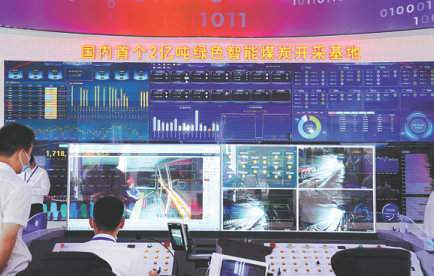Switch from traditional manufacturing brings environmental benefits

A staff member of China Energy demonstrates how to operate its green, intelligent mining system at the 2021 Zhongguancun Forum in Beijing in September. CHINA DAILY
In recent years, the Beijing government has sought to transfer traditional manufacturing businesses from the capital to relocate to other parts of the country, as it shifts its economic focus onto more advanced and high-tech industries.
That focus rose in the wake of Beijing's successful bid in 2015 to host the 2022 Winter Olympics, which will be held in February next year. The shift to high-tech has been accompanied by greater attention on ecological development.
Beijing will nurture a batch of cutting-edge industries to promote the development of green energy, energy conservation and environmental protection industries, said Li Tao, a senior official with the Beijing Economy and Information Technology Bureau.
According to Li, a total of 2,154 general manufacturing companies have withdrawn from Beijing since 2015.
Last year, advanced industries in the capital achieved an added value of 988.58 billion yuan ($155.62 billion), accounting for 27.4 percent of the city's GDP.
The added value of the high-tech industry and strategic emerging industries has increased 56.9 percent and 58.5 percent respectively from 2015.
During the 13th Five-Year Plan period (2016-20), Beijing's new-generation information technology industry and science and technology service industry was valued at 1 trillion yuan each. During the same period, the city's intelligent equipment, medicine and healthcare, energy conservation and environmental protection, and artificial intelligence clusters became valued at 10 billion yuan each.
The government has attached great importance to green development in industries. Last year, the energy and water consumption for every 10,000 yuan of industrial value-added declined 22.7 percent and 35.2 percent respectively compared with 2015.
During the 13th Five-Year Plan period, 64 companies became listed as national-level green factories; 11 companies became national green supply chain management demonstration units; nine businesses were selected as national industrial product green design demonstration companies; 56 local products were selected as national green products; and the Beijing Economic-Technological Development Area was designated as a national green park.
The city government said it will continue to improve the low-carbon development of the manufacturing industries. The measures include promoting the application of new energy and renewable energy sources, such as solar and wind power, and heat pumps.
Companies are being encouraged to reduce the use of fossil fuel energy sources, develop innovative applications of low-carbon technologies and accelerate digital applications using AI, the internet of things, cloud computing and blockchain, Li said.
According to Li, Beijing will seize the opportunity of hosting the 2022 Olympic and Paralympic Winter Games and further improve industrial energy conservation, carbon reduction and green development.
By the end of 2025, the city will have made more significant contributions to ecological protection and is expected to continue maintaining a nationally advanced level of green development, he said.
